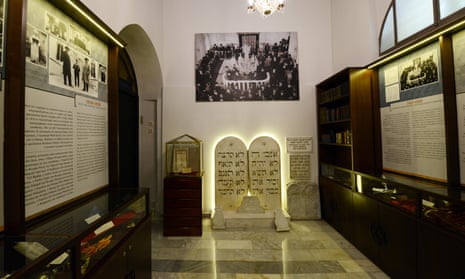Five centuries after they were expelled from Spain and eight decades after they were almost annihilated in the Holocaust, the small community of Sephardic Jews that lives on in the Greek city of Thessaloniki is looking to its past to help safeguard its future.
On Tuesday, Thessaloniki’s Jewish community signed a deal with the Spanish government’s Instituto Cervantes to create a small centre where people will be taught modern Spanish while also learning about Sephardic culture and the exiles’ still-spoken language, Ladino.
Many Spanish Jews came to Thessaloniki, which was then part of the Ottoman empire, following their expulsion by King Ferdinand and Queen Isabella in 1492. The community endured and thrived over the centuries but came close to total destruction when the Nazis deported and murdered more than 90% of the city’s Jewish inhabitants.
Today, Thessaloniki’s Jewish community has dwindled to about 1,200 people, most of them the descendants of the Iberian exiles.
“The community here was built by Jews from Spain – places such as Toledo, Granada and Seville,” said David Saltiel, president of the Jewish Community of Thessaloniki. “It was a community that spoke, ate and sang Spanish. After the Holocaust, only 1,500 Jews were left, but we’ve always kept that idea of our Spanish past in our hearts and we want to keep our traditions alive.”
Under the new agreement, the community will provide premises, memories and tradition, while the Instituto Cervantes – which promotes Spanish language and culture – will provide teachers and academic experts on contemporary Spanish and Ladino, which is also known as Judeo-Spanish.
While the project is mainly aimed at children and young people in the Sephardic community, it will open to those of all ages and faiths.
Cristina Conde de Beroldingen, director of the Instituto Cervantes in Athens, said the initiative was designed to help preserve Sephardic culture and language, and also to stop Thessaloniki losing a piece of its past.
After the Holocaust, many of those who survived decided to move to Israel, taking their history, language and culture with them. “With that, Thessaloniki as a city also lost a piece of its own memory,” said Conde de Beroldingen.
“But, as the president of the community put it, Spanish is coming back to Thessaloniki after 500 years. We want to recover this legacy for Thessaloniki: there were a lot of newspapers in Judeo-Spanish, so it’s a good time to go digging in the archives.”
Conde de Beroldingen said the idea was to strike a balance between teaching modern Spanish and preserving Ladino. “We want to teach young people to distinguish between the two and learn about the different words for the same thing,” she said.
“That’s really important, because there’s sometimes a danger of standardising things, and that’s something we’re keen not to do.”
Ladino, she added, was a reminder of both the exile of the Iberian Jews and of how people spoke Spanish 500 years ago. “I don’t think there’s another community that was expelled from a country but which has managed to keep its identity and its language for so many years,” she said.
“But Judeo-Spanish is also the language of Don Quixote, of how Spanish was written back them. It’s the Spanish of the time, but enriched by words from the countries through which the exiled Jews passed. There’s obviously Hebrew, but there’s also Turkish, Greek, French and Italian.”
For Saltiel, the new centre is a lifeline for Thessaloniki’s Jewish community and for its language. “We can’t let this be forgotten; if it’s forgotten, it will die,” he said. “But if we carry on speaking, it will live on.”
The project, however, is about more than the survival of the city’s Sephardic inhabitants; it is also about Europe’s past.
“The Greeks can learn about our story because it’s part of Greek history, too,” said Saltiel. “We’ve been here for 530 years, and that’s a long old time. We lost 97% of the community in the Holocaust, but we’re still here and we’re going to carry on and show everyone that this Spanish-Jewish community is alive, is still speaking Spanish, and is going to keep carrying on.”
